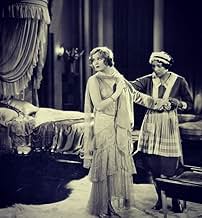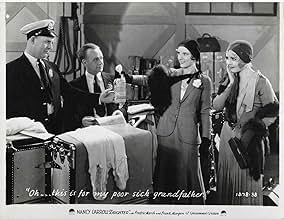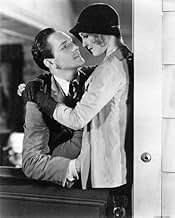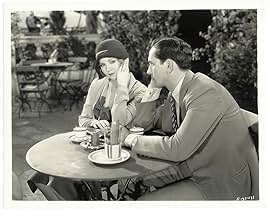Adicionar um enredo no seu idiomaA former chorus girl weds a millionaire after the composer she loves leaves. Meanwhile, she strings along an artist in love with her. When the composer returns, she struggles with her needs ... Ler tudoA former chorus girl weds a millionaire after the composer she loves leaves. Meanwhile, she strings along an artist in love with her. When the composer returns, she struggles with her needs for security vs love. High jinks and drama ensue.A former chorus girl weds a millionaire after the composer she loves leaves. Meanwhile, she strings along an artist in love with her. When the composer returns, she struggles with her needs for security vs love. High jinks and drama ensue.
- Direção
- Roteiristas
- Artistas
- Indicado a 1 Oscar
- 3 vitórias e 1 indicação no total
Eric Blore
- Party Guest in Angel Costume
- (não creditado)
Charles Halton
- Winslow - Gibson's Secretary
- (não creditado)
Duncan Penwarden
- Mr. Miller
- (não creditado)
Avaliações em destaque
I watched LAUGHTER, a 1930 film starring Nancy Carroll and Fredric March. Many comments and reviews state this film as a forerunner of the 30s screwball comedy. Yes there were some screwball elements, such as the silly sequence when the stars, caught in the rain, break into a house and put on bear rugs while their clothes dry. There's also a terrific scene when March is playing piano when the butler (Leonard Carey) tries to correct him. They end up playing duets! There's also a nice party scene where Eric Blore shows up in an angel costume. Another standout scene is when the daughter (Diane Ellis) starts to jazz dance and is joined by Carroll while Frank Morgan sourly looks on. Also of interest is Pearl the maid, played by Ollie Burgoyne, who was better known as Olga Burgoyne, a dancer in many stage shows.
Still, I don't see this film as a comedy, let alone a screwball comedy. Carroll (she's very good) plays a former show girl who marries Morgan for his money. His daughter is only a little younger than Carroll. The daughter is a little wild; Carroll is a lot bored. She has everything in her life but "laughter." When she takes up with March, we know the marriage is doomed. So does everyone else.
Morgan's character hasn't an ounce of humor in him. There's also a tragic starving artist type (Glenn Anders) who gets involved with Ellis. It's with this character that any shred of comedy drains from the picture as doom settles over the storyline.
This is still a very good film with solid work from its stars.
Still, I don't see this film as a comedy, let alone a screwball comedy. Carroll (she's very good) plays a former show girl who marries Morgan for his money. His daughter is only a little younger than Carroll. The daughter is a little wild; Carroll is a lot bored. She has everything in her life but "laughter." When she takes up with March, we know the marriage is doomed. So does everyone else.
Morgan's character hasn't an ounce of humor in him. There's also a tragic starving artist type (Glenn Anders) who gets involved with Ellis. It's with this character that any shred of comedy drains from the picture as doom settles over the storyline.
This is still a very good film with solid work from its stars.
Up until July, 1934, the job of policing the films out of Hollywood was mostly left up to Hollywood. There was no rating system and practically anything might appear in movies. While not extremely common, nudity, adultery, abortion, homosexuality and promiscuity were featured in quite a few pictures...including in Biblical epics such as "Ben Hur" (1925) and "The Sign of the Cross". Often, when folks use the term 'pre-code' they are usually referring to the more extreme films of this era...and "Laughter" clearly is a pre-code plot, as its main theme is adultery.
When the film begins, you learn that Peggy (Nancy Carroll) has married a rich guy (Frank Morgan). But she also has had some admirers--including a suicidal artist and one lover (Frederic March) who stops by for a visit! Now Peggy must decide whether she wants to stay married to the rich man or run off with fun-loving Paul.
Post 1934, such plots clearly would NOT have been allowed until, perhaps, the 1960s. The notion of an old boyfriend showing up and the young wife going off with him to spend a day with him was just too broadminded for the post-code days...and hard to believe that the husband would just sit back and allow this outing to take place. It is, however, reasonably interesting to watch though not the comedy I expected (IMDB called it a comedy romance...but there were very few laughs). Worth your time...especially if you are a pre-code fan but not a fan I'd rush to see either.
When the film begins, you learn that Peggy (Nancy Carroll) has married a rich guy (Frank Morgan). But she also has had some admirers--including a suicidal artist and one lover (Frederic March) who stops by for a visit! Now Peggy must decide whether she wants to stay married to the rich man or run off with fun-loving Paul.
Post 1934, such plots clearly would NOT have been allowed until, perhaps, the 1960s. The notion of an old boyfriend showing up and the young wife going off with him to spend a day with him was just too broadminded for the post-code days...and hard to believe that the husband would just sit back and allow this outing to take place. It is, however, reasonably interesting to watch though not the comedy I expected (IMDB called it a comedy romance...but there were very few laughs). Worth your time...especially if you are a pre-code fan but not a fan I'd rush to see either.
Harry D'Abbadie d'Arrast doesn't hang about with this tale of rags to riches that has loads of emotional baggage thrown in for good measure. "Peggy" (Nancy Carroll) is let down by her true love and takes the easy option by marrying the dull and staid millionaire "Gibson" (Frank Morgan) who guarantees her an easy, if uninteresting life. She's too restless a spirit for all of that, and although she resists the advances of the boyish and unstable sculptor "Ralph" (Glenn Anders) she is ready to jump ship when the carefree "Lockridge" (Fredric March) re-emerges into her life with a plan for her to escape her silk-clad drudgery and head for la Vie Parisienne - via some high jinx and a bit of burglary. Tempted, her life is thrown into turmoil by the daughter of her husband, "Marjorie" (Diane Ellis) who has a few designs of her own! This tries hard to straddle a few genres here, and whilst the dramatic aspects work well enough, the comedic ones prove a little beyond everyone to convincingly pull off. As the story progresses, even the usually reliable Morgan looks a little uncomfortable with the increasingly contrived nature of the plot within a plot within a plot. Also, by the end I'd rather concluded that "Peggy" was no great shakes as an human being either. The production could fairly be described as embryonic and the photography seemed framed at times as if to allow the actors to read cue cards off-set the cameras - that looked a bit squinty. Still, it's all quite light-hearted and enjoyably enough paced to pass ninety minutes effortlessly.
...And she's buying a STAIRWAY TO HEAVEN
Not sure whether Led Zeppelin were inspired by this film but but the theme, or rather the song remains the same which is as Paul McCartney wrote: MONEY CAN'T BUY ME LOVE.
It's somewhat idealistic since that hippie dream of non-materialism probably grated a bit with the audience of 1930. The Great Depression had just started and millions of Americans were now forced into poverty and even starvation so maybe they didn't have a lot of sympathy for Nancy Carroll's millionaire character bemoaning lack of excitement in her privileged life.
Nancy Carroll plays Peggy, a former Zigfield girl who's achieved the classic chorus girl dream of marrying a millionaire. But it's a case of: 'be careful what you wish for' because despite the diamonds and the mansion, she's not cut out to be just a demure, subservient trophy wife and is still seeing a couple of men behind her husband's back. One has to be sorry for the husband - cheating on The Wizard of Oz just isn't right!
It's worth sticking with this - although it starts off a bit slow and 'arty' it quickly speeds up and evolves into a really absorbing, witty and enjoyable drama. You have to pinch yourself at times to remind you that this was made in 1930. The acting is perfect and natural - as far away from that awful static, stagey style common in those very early sound films as is imaginable. There's even a musical score, there's classy art-deco sets, there's realistic dialogue and unlike most films of this age, very fluid camerawork with innovative and imaginative tracking shots - it's like nothing you'd expect from 1930.
What makes this special is its director Harry d'Abbadie d'Arrast whose talent lives up to his cool name. Had a lesser director made this it could have become just the typical dross of 1930 but considering the limitations of film making at the dawn of the sound age, he works miracles. He truly brings the story and the characters to life and imbues it with wit, humour and humanity. He even brings honesty to the happy ending by tempering it with real life since as the song goes: And a new day will dawn for those who stand long and the forests will echo with laughter.
Not sure whether Led Zeppelin were inspired by this film but but the theme, or rather the song remains the same which is as Paul McCartney wrote: MONEY CAN'T BUY ME LOVE.
It's somewhat idealistic since that hippie dream of non-materialism probably grated a bit with the audience of 1930. The Great Depression had just started and millions of Americans were now forced into poverty and even starvation so maybe they didn't have a lot of sympathy for Nancy Carroll's millionaire character bemoaning lack of excitement in her privileged life.
Nancy Carroll plays Peggy, a former Zigfield girl who's achieved the classic chorus girl dream of marrying a millionaire. But it's a case of: 'be careful what you wish for' because despite the diamonds and the mansion, she's not cut out to be just a demure, subservient trophy wife and is still seeing a couple of men behind her husband's back. One has to be sorry for the husband - cheating on The Wizard of Oz just isn't right!
It's worth sticking with this - although it starts off a bit slow and 'arty' it quickly speeds up and evolves into a really absorbing, witty and enjoyable drama. You have to pinch yourself at times to remind you that this was made in 1930. The acting is perfect and natural - as far away from that awful static, stagey style common in those very early sound films as is imaginable. There's even a musical score, there's classy art-deco sets, there's realistic dialogue and unlike most films of this age, very fluid camerawork with innovative and imaginative tracking shots - it's like nothing you'd expect from 1930.
What makes this special is its director Harry d'Abbadie d'Arrast whose talent lives up to his cool name. Had a lesser director made this it could have become just the typical dross of 1930 but considering the limitations of film making at the dawn of the sound age, he works miracles. He truly brings the story and the characters to life and imbues it with wit, humour and humanity. He even brings honesty to the happy ending by tempering it with real life since as the song goes: And a new day will dawn for those who stand long and the forests will echo with laughter.
I was expecting this movie to be much more than it was. I read that it was one of Fredric March's personal favorites, his others being A Star is Born, Death Takes a Holiday, and Best Years of Our Lives, and so since he liked it I thought it was going to be really good. I must say I was really bored with it. The story seemed boring and not really well written. I think it could have been a much better story if the script was better. As is, there were too many loose ends. Sure, there were some funny moments (it was enjoyable to see Fred draped in a white bearskin rug!), and Fred gave a few kisses, and you got to see him in his undershirt. But I have seen him in MUCH better roles, more romantic, more funny...everyone's opinion is different. This is mine...It is one of the few Fred movies I didn't really like.
Você sabia?
- CuriosidadesOrson Welles cast scene-stealing character-actor Glenn Anders in The Lady From Shanghai because he had remembered how good he was in this film.
- ConexõesAlternate-language version of A Mulher Que Ri (1931)
- Trilhas sonorasLittle Did I Know
by Irving Kahal, Pierre Norman and Sammy Fain
Principais escolhas
Faça login para avaliar e ver a lista de recomendações personalizadas
Detalhes
- Tempo de duração1 hora 25 minutos
- Cor
- Proporção
- 1.20 : 1
Contribua para esta página
Sugerir uma alteração ou adicionar conteúdo ausente

Principal brecha
By what name was O Melhor da Vida (1930) officially released in Canada in English?
Responda





























